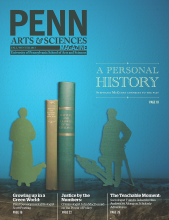Democracy is not one size fits all. According to Brendan O’Leary, two places that espouse the same basic democratic principles might, in reality, have very different power-sharing structures—and be all the better for it.
O’Leary, Lauder Professor of Political Science, has firsthand experience in shaping governments. As a constitutional advisor for the United Nations, he promoted the re-building of Somalia. His ideas were influential in the Irish peace process. He has been hired in constitutional consultancies on power-sharing in coalition governments in South Africa and in Nepal. And after 2003 O’Leary acted as an international constitutional advisor to the Kurdistan Regional Government in Iraq.
O’Leary’s 2013 collection Power-Sharing in Deeply Divided Places, co-edited by then post-doctoral fellow at the Penn Program in Ethnic Conflict Joanne McEvoy, arose out of the Andrew W. Mellon Sawyer Seminar Series, which in previous years had brought together eminent scholars to examine the question of power-sharing. The volume features analytical studies of power-sharing systems past and present, as well as critical evaluations of the role of electoral systems.
“The absence of despotism or of overt monopolization of government does not necessarily mean a democratic system involves power-sharing,” says O’Leary. “Normal democracies with majority rule can indeed become mechanisms of ethnic, religious, or nationalist tyranny, and quite lawfully within the canons of democratic theory. In order to have an objective view, you need to inquire whether power-sharing is required in a particular place and address the very important question of whether power-sharing works.”
There are two main forms of power-sharing, O’Leary says. The first is the consociational system, under which executive power is shared by representatives of multiple ethnic communities. Proportionality rules apply and group-based veto powers exist. Individual ethnic groups enjoy some autonomy and self-government in regards to religion, language, and control of schooling. Though this structure may have its disadvantages and appear alien to Americans who have embraced the melting pot mentality, O’Leary says, allowing different ethnic groups to maintain their autonomy and share power has been effective. This approach has made the recurrence of violence less likely, and achieved higher-quality democratic outcomes.
“The danger of consociational systems is that they have the potential to create circumstances in which groups will be more rigid,” O’Leary says. “But often it has the opposite effect and over time the various groups’ concern about historic rivalries decreases, and eventually you see a slow dissolution of hardened group identities.”
O’Leary cites the Netherlands, which for many years had a pillarized society in which Calvinists, Catholics, and secular people went to separate schools and universities, read separate media, and had separate social organizations, including separate factories. But through successful power-sharing and the avoidance of violent conflict, there’s been a softening, which allowed the development of a shared Dutch identity.
The second form of power-sharing is the federation—more familiar to Americans. In this model, power is shared between federal and regional or state governments. And while many would agree this system has been successful in the States, it can go terribly wrong if the American model is applied to the wrong place. The U.S. model, for example, has never empowered a racial, linguistic or non-Protestant minority to be a majority at the level of an individual state. Elsewhere multi-national federations, built around territorial autonomy for minority groups, have been very successful: “I think of Canada or Belgium; think of the re-building of India’s states around its major linguistic communities.” One key consideration, O’Leary says, is that no two places are alike, and efforts to nation-build in areas with established ethnic or religious autonomy are often counterproductive.
“In contemporary Syria, for instance, there are highly mobilized, highly self-conscious Alawites, Sunnis, Christians, Kurds, Druze, and Ismailis. So instead of demanding an imaginary Syria in which ‘we’re all just Syrians,’ why not use these groups as the building blocks of a new political settlement? The idea that there can be a democratic peace in Syria merely on the basis of majority-rule and equal citizenship is illusory.”




